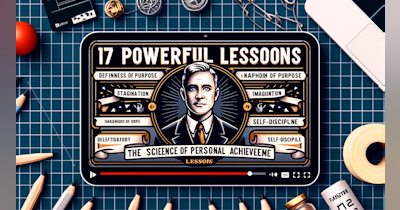Explore key insights from 'Outwitting The Devil' by Napoleon Hill. This summary and collection of profound quotes dive into overcoming life's challenges.
"Outwitting the Devil" by Napoleon Hill offers more than just insights into achieving personal goals.
Written in 1938, this book, structured as a dialogue with the 'Devil,' remained unpublished for over seven decades due to its controversial nature. Although he wrote it in 1938, it wasn't published until long after he passed away in 2011.
This book dives into the concept of 'drifting,' which Hill identifies as a primary obstacle to success. He explores how this state of aimlessness leads to failure and emphasizes the significance of overcoming it.
Hill's work isn't just a personal success guide; it underscores the value of community service and collective well-being for true fulfillment.
Here, I’ll give you a summary of the main ideas in the book and some of my favorite quotes!
By the way, you should know that inside the Secrets of Success Community, you can get access to over 30+ hours of exclusive audiobook recordings from Napoleon Hill… and authors like Charles F. Haanel, Elsie Lincoln Benedict, and other legends of the “new thought” movement. Test Drive Secrets of Success For Free!
10 Key Lessons From Outwitting The Devil by Napoleon Hill
Here are some of the key lessons from outwitting the devil!
1. The Importance of Having a Definite Purpose
Napoleon Hill in "Outwitting the Devil" drives home the point about how crucial it is for you to have a clear goal in life. If you're wandering through life without a solid aim or purpose, you're more likely to get swayed by negative influences or make choices that don't really serve you.
Hill's pretty blunt about it when he says, "Drifting, without aim or purpose, is the first cause of failure."
What he means is, if you don't know where you're going, you're easy prey for the metaphorical 'Devil' of distraction and self-doubt.
To put it simply, you should figure out what you're passionate about and set solid goals. It's like having a roadmap for your life. Without it, you might end up just drifting and getting lost.
So, it's super important for you to find your direction and stick to it, otherwise, you might find yourself easily thrown off course by life's challenges and obstacles.
2. The Power of Persistence
Giving up too easily is often what keeps you from achieving your dreams.
Hill points out that setbacks and failures aren't the end of the road. Instead, think of them as lessons that teach you and help you grow.
There's this great example Hill gives about Thomas Edison and his journey to invent the light bulb. Despite thousands of failures, Edison didn't give up. He kept at it, and eventually, he succeeded and changed the world.
Persistence is key. Hill says that the 'Devil' relies on people giving up to maintain control. It’s when you face a challenge and refuse to back down, that’s when you start to take control of your own life.
3. Overcoming Fear and Negative Influences
Napoleon Hill highlights how fear is a major tool that can keep you from reaching your potential.
He explains that fear often leads to doubt and indecision, which can make you feel stuck and prevent you from fulfilling your true capabilities.
To beat this, Hill urges you to learn to face your fears and embrace positive influences and thoughts.
Hill describes how most fears are not as big as they seem and are often blown out of proportion in our minds.
By changing how you think and what you focus on, you can start to shrink these fears down to size. It's about shifting your mindset from fear to positivity. This doesn't mean ignoring your fears, but rather understanding them and then moving past them.
4. The Significance of Critical Thinking and Self-Reliance
Napoleon Hill stresses the importance of critical thinking and self-reliance. He warns about the dangers of 'drifting' – which means going along with whatever, not questioning things, or relying too much on others' opinions.
He wants the reader to understand that it's vital to think for yourself, question everything, and make your own decisions based on your understanding and insights.
A quote that captures this idea is, "Tell the world what you intend to do, but first show it." This is Hill's way of saying that action and personal initiative matter more than just talking about your plans.
5. The Six Deadly Fears
In "Outwitting the Devil," Napoleon Hill shares six fears that can hold you back in life. These fears, which he describes as the 'Devil’s tools,' include the fear of poverty, criticism, ill health, loss of love, old age, and death. Hill points out how these fears often start taking root in our minds from a young age and can deeply impact our lives if not addressed.
The fear of poverty, for example, can make you so afraid of losing your job that you never step out of your comfort zone or pursue your true calling. Similarly, fear of criticism might stop you from expressing your ideas or trying new things. Hill's message is that these fears can keep you trapped and prevent you from living the life you truly want.
To overcome these fears, Hill suggests believing in yourself and your abilities, continually improving your skills, and connecting with the right people.
It's about finding what you really want in life and not stopping until you get there.
6. The Flaws of the School System and the Importance of Personal Education
Hill argues that schools often focus too much on memorization and rote learning, failing to encourage critical thinking or creativity. He believes that this kind of education leads to 'drifting,' where people lack the ability to think independently and make their own decisions.
Hill is convinced that true education goes beyond what is taught in schools. He suggests that self-education and personal development are key to achieving success and outwitting the 'Devil' of conformity and mediocrity.
For instance, he points out that real-world experience, reading a variety of books, talking with knowledgeable people, and attending events or conferences can offer valuable learning opportunities that traditional education may not provide.
In essence, Hill's critique of the school system is a call for a broader view of education — one that fosters individuality, self-reliance, and critical thinking. It's about taking your learning into your own hands, exploring topics that interest you, and developing skills that align with your personal goals and aspirations.
7. Setting Clear Goals
Hill argues that without specific goals, you're likely to drift through life, easily influenced and lacking direction. He compares this to cooking – without a clear recipe and the right ingredients, you can't expect to make a successful dish. Similarly, in life, knowing exactly what you want to achieve is like having a recipe for success.
Hill explains that setting goals is more than just having a vague idea of what you want. It's about knowing your destination and then mapping out the steps to get there.
This process of setting goals gives you a sense of control and purpose, making you less susceptible to drifting. He advises that by defining your goals, you also define the path of your life.
8. Faith as the Foundation of Achievement
Hill believes that faith, coupled with self-belief, is the driving force behind persistence and the pursuit of one’s goals, no matter how many times one faces setbacks.
Hill’s point is that faith is not just a religious concept; it's a state of mind that can empower you to overcome challenges and pursue your dreams with confidence. This faith is about believing in your own potential and capabilities, even when the odds seem stacked against you.
It's about trusting that your efforts will eventually lead to success, even if the path is fraught with difficulties.
9. Analysis of Temporary Defeat for Positive Outcomes
Napoleon Hill emphasizes the importance of analyzing temporary defeats to find hidden benefits. He suggests that instead of viewing setbacks as purely negative, you should analyze them to uncover valuable lessons and opportunities for growth.
Hill says, “Every adversity, every failure, every heartache carries with it the seed of an equal or greater benefit.” This perspective encourages you to look for the silver lining in difficult situations and use these experiences as stepping stones towards success.
This approach to defeat is about transforming challenges into learning experiences. It’s about adopting a mindset that views failure not as an endpoint, but as a vital part of the journey to achievement.
10. Importance of Time and Thought
Napoleon Hill also highlights the critical importance of time and the power of thought. He advises that your greatest assets are time and the power of thought, urging you to use both wisely.
Hill states, “Recognize that your greatest asset is time, the only thing except the power of thought which you own outright, and the one thing which can be shaped into whatever material things you want. Budget your time so none of it is wasted.”
Hill's message is clear: the way you spend your time and what you think about most has a profound impact on your life.
29 Favorite Quotes From Outwitting The Devil!
Here are some of my absolute favorite quotes from Outwitting The Devil!
"The greatest forces are intangible and invisible, yet they produce tangible and visible results."
"Success is the result of the controlled use and direction of the mind."
"Nature will not tolerate idleness, mental or physical."
"Fear is the tool of a man-made devil."
"A negative mind never attracts happiness and prosperity."
"No one ever gets rich by saving money."
"Failure always is a blessing when it forces one to acquire knowledge or to build habits that lead to the achievement of one’s major purpose in life."
"The capacity to surmount failure without being discouraged is the chief asset of every person who attains outstanding success in any calling."
"You are entitled to know that two entities occupy your body. One of these entities is motivated by and responds to the impulse of fear. The other is motivated by and responds to the impulse of faith."
"Failure is man-made circumstance. It is never real until accepted by man as permanent."
"Your only limitation is the one which you set up in your own mind."
"Most real failures are due to limitations which men set up in their own minds."
"Every adversity brings with it the seed of an equivalent advantage."
"Failure brings a climax in which one has the privilege of clearing his mind of fear and making a new start in another direction."
"Anyone who submits to annoyance by things he does not want is not definite. He is a drifter."
"The person who moves with definiteness recognizes the difference between temporary defeat and failure. When plans fail he substitutes others but he does not change his purpose. He perseveres."
"Remember that your dominating thoughts attract, through a definite law of nature, by the shortest and most convenient route, their physical counterpart."
"From what you say, I infer that time is the friend of the person who trains his mind to follow positive thought-habits and the enemy of the person who drifts into negative thought-habits."
"One’s dominating desires can be crystallized into their physical equivalents through definiteness of purpose backed by definiteness of plans with the aid of rhythm and time."
"Children are sent to school to make credits and to learn how to memorize, not to learn what they want of life."
"The majority of people who acquire wisdom do so after they have passed the age of forty."
"Then accumulated knowledge is not wisdom?"
"Men and women who come to the closing chapter of life disappointed because they did not attain the goal which they had set their hearts upon achieving, they teach you what not to do."
"The Devil claims that those who drift do not think for themselves but accept the thoughts which others prepare for them."
"The drifter never accomplishes anything requiring thought and effort. He accepts whatever life hands him without protest and without demanding that he wants in life."
"I am the negative portion of the atom; I represent the electron, while my opposition represents the proton. The proton and the electron are forever seeking to become a neutron."
"The habit of drifting is a form of hypnotic rhythm, which finally becomes permanent and it fixes the characteristics of nature and the life habits of those who submit to it."
"The fear of poverty, criticism, ill health, loss of love, old age, and death are the six basic fears with which my opposition, the Devil, enters the minds of people."
"An educated person is not, necessarily, one who has an abundance of general or specialized knowledge. An educated person is one who has so developed the faculties of their mind that they can acquire anything they want."
Want More?
Inside my Secrets of Success Community, you can get access to over 30+ hours of exclusive audiobook recordings from Napoleon Hill… and authors like Charles F. Haanel, Elsie Lincoln Benedict, and other legends of the “new thought” movement. Try it out for free!









